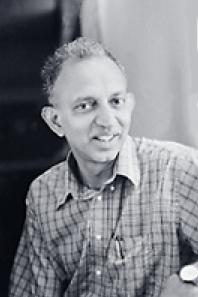Professor Ravindran Kannan ரவீந்திரன் கண்ணன் | |
|---|---|
 Ravindran Kannan Prix Knuth 2011 | |
| Born | 12 March 1953 |
| Alma mater | Indian Institute of Technology Bombay (B.Tech.) Cornell University (Ph.D.) |
| Awards | Knuth Prize (2011) Fulkerson Prize (1991) |
| Scientific career | |
| Fields | Computer science |
Ravindran Kannan (Tamil: ரவீந்திரன் கண்ணன்; born 12 March 1953, Madras)[1] is a Principal Researcher at Microsoft Research India, where he leads the algorithms research group. He is also the first adjunct faculty of Computer Science and Automation Department of Indian Institute of Science.
Before joining Microsoft, he was the William K. Lanman Jr. Professor of Computer Science and Professor of Applied Mathematics at Yale University. He has also taught at MIT, CMU and IISc. The ACM Special Interest Group on Algorithms and Computation Theory (SIGACT) presented its 2011 Knuth Prize to Ravi Kannan for developing influential algorithmic techniques aimed at solving long-standing computational problems.[2] He also served on the Mathematical Sciences jury for the Infosys Prize in 2012 and 2013.
Ravi Kannan did his B.Tech at IIT, Bombay. He received his PhD in 1980 at Cornell University under Leslie Earl Trotter, Jr.[3] His research interests include Algorithms, Theoretical Computer Science and Discrete Mathematics as well as Optimization. His work has mainly focused on efficient algorithms for problems of a mathematical (often geometric) flavor that arise in Computer Science. He has worked on algorithms for integer programming and the geometry of numbers, random walks in n-space, randomized algorithms for linear algebra and learning algorithms for convex sets.
YouTube Encyclopedic
-
1/3Views:8 6445 265985
-
Ravi Kannan -- Foundations of Data Science
-
Intro and Foundations of Data Science I
-
Foundations of Data Science II
Transcription
Key contributions
Among his many contributions, two are
- Polynomial-time algorithm for approximating the volume of convex bodies
- Algorithmic version for Szemerédi regularity partition
Selected works
Books
- 2013. Foundations of Data Science. (with John Hopcroft).
Other representative publications
- "Clustering in large graphs and matrices," with P. Drineas, A. Frieze, S. Vempala and V. Vinay, Proceedings of the Symposium on Discrete Algorithms, 1999.
- "A Polynomial-Time Algorithm for learning noisy Linear Threshold functions," with A. Blum, A. Frieze and S. Vempala, Algorithmica 22:35–52, 1998.
- "Covering Minima and lattice point free convex bodies," with L. Lovász, Annals of Mathematics, 128:577–602, 1988.
Awards and honors
- Joint Winner of the 1991 Fulkerson Prize in Discrete Mathematics for his work on the volumes of convex bodies.[4]
- Knuth Prize 2011 for developing influential algorithmic techniques aimed at solving long-standing computational problems.[2]
In 2017 he became a Fellow of the Association for Computing Machinery.[5]
See also
References
- ^ Who's Who in Frontiers in Science and Technology 1985
- ^ a b Microsoft Researcher to Receive ACM SIGACT Knuth Prize Archived 2011-04-29 at the Wayback Machine
- ^ "Ravindran Kannan". The Mathematics Genealogy Project. Retrieved 23 June 2022.
- ^ Distinguished Alumnus Archived 2011-10-07 at the Wayback Machine
- ^ Cacm Staff (March 2017), "ACM Recognizes New Fellows", Communications of the ACM, 60 (3): 23, doi:10.1145/3039921, S2CID 31701275.
External links
- Ravi Kannan's home page
- Ravi Kannan at DBLP Bibliography Server
- Distinguished Alumni Awardees 1999, IIT Bombay
- Fulkerson Prize Award
